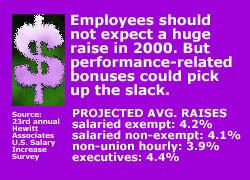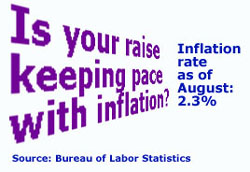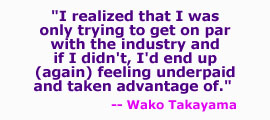|
Fattening your paycheck
|
 |
October 13, 1999: 7:19 a.m. ET
How, when you ask for a raise are as critical as the reasons you deserve one
By Staff Writer Jeanne Sahadi
|
NEW YORK (CNNfn) - Maybe you know your intrinsic worth can never be measured by a paycheck -- but you also know that a few extra bucks can do wonders for your ego.
So if you feel unseen, unsung or underpaid on the job, it may be time to ask for a raise. But doing so successfully requires some work on your part.
Keep a paper trail
Compensation consultant Alison Peterson of Hewitt Associates and other experts recommend you take a few key steps before approaching your boss:
- Evaluate your performance;
- Assess how much you have grown in terms of new skills and responsibilities;
- Document your accomplishments; and
- Find out the going market rate for your job by checking local salary surveys, asking peers in the same field and contacting industry associations.
Don't underestimate the importance of cataloguing your achievements.
"Many people think their employer knows what they've been doing," said Earl Tillman, author of How to Get a Raise or Promotion Without Asking. But they usually don't -- or at least not to the extent you think, he said.

As you prepare your presentation, keep in mind that raises are not awarded just for showing up every day, and your manager will take into account his or her own observations of your performance and reviews of your work by others in the firm.
Timing is everything
Once you determine you have good reason to ask for more, the next step is to meet with the boss.
A well-timed discussion can make the difference between getting what you want and getting on his or her nerves.
In making an appointment, "you don't want to go into details" said J. Michael Farr, author of several career-planning books. And, he stressed, be sure to set up a time when you'll have the manager's full attention.
One way to do that, Tillman suggested, is to be mindful of your company's business cycle and your boss' schedule. If you work for a retailer, for instance, the holiday shopping season could be the worst time for such a discussion.
The cons of annual review time
Normally, people will broach the issue of a raise around the time of their annual review. But this is not necessarily the best moment.
Indeed, Farr said, the kinds of forms filled out for reviews are often geared to "elicit negative information," offering fuel for your boss to focus on your weaknesses as much as your strengths.
So even if your firm only offers raises once a year, a meeting held in advance of that period will plant a seed in your boss's mind that may bear fruit by the time your review rolls around, Farr said.
When you're face to face
Now that you've gotten your manager behind closed doors and are ready to make your pitch, you are bound to be tense -- after all, who actually enjoys these meetings?
But keep your nerves -- and any anger -- hidden.
"You don't want confrontation - you want your boss to see you as an up-and-comer," Farr said.
He and others advise that you couch your words carefully. No matter how much of a raise you deserve, threats and insults will only alienate your boss -- for a long time.

So think before you speak. And, while you're at it, think like a diplomat. Like all good negotiators, be sure to have something in hand before you walk away from the table.
If your boss can't afford to give you the raise he or she knows you deserve, consider bargaining for more vacation or flex time, Peterson said.
Or, if the boss is unwilling to boost your salary at that time, get him or her to commit to a list of things you need to do in a given period to qualify for more money later, Farr suggested.
And don't think of the meeting as a loss. It lets your boss know, "I want more responsibility. I want to be more valuable to the organization," Farr said, and the guidelines give you leverage the next time you ask for bump in pay.
The power principle
And leverage is definitely what you want.
Part of what makes asking for more money so uncomfortable is the power dynamic: Your employer often has the upper hand in negotiations.
Of course, you can always threaten to quit if you don't get what you want, but experts say that's a poor strategy unless you have a better offer lined up and are ready to take it.

"Lots of employers don't want people around who aren't loyal," Farr said.
For most of us, the goal is not to leave in a huff but to get the best deal.
And while it is cold comfort to the underpaid, most companies don't strive to be unfair.
With large employers, in particular, discriminatory patterns and other pay inequities "just kind of creep in," Farr noted.
Indeed, said Peterson, who consults with firms about compensation and benefits policies, "Most of my clients are very concerned about doing the right thing."
Which is not to say they always do.
Getting to fair
Take pay inequities. You get wind that a colleague with the same title but less experience is earning more. Or your firm just merged and the people who have joined your unit are better compensated. Or you learn that locally, peers in your industry command a higher wage.
If you suspect you are being unfairly paid, examine the situation more closely before sounding the alarm. For instance, consider:
- Is the person in the next cubicle really doing the same job as you? Does he offer different skills? Beware, Peterson said. Head-to-head comparisons are "dangerous" and do not usually make very effective arguments.
- Is your salary significantly lower than the going rate in your area? National averages are not the best measuring stick, since they don't control for the fact that salaries in big cities tend to be higher than in smaller areas. Check with your state's labor department or metropolitan area estimates for a more relevant comparison.
- What plans, if any, does your firm have to make pay more equitable after a merger?
If you do have enough fact-based evidence to approach the boss, couch your concerns in helpful, positive terms.
Among the approaches Farr, Peterson and others recommend:
- "I feel I'm doing a good job here, and yet I understand I'm making less than (Peter). What do I need to do to earn more?"
- "We hate to bring this up, but those of us who have been in the department awhile are concerned about the discrepancy in pay scales. We know you want to be fair. What do you think would be a good solution?"
- "I really like working here and would like to stay, but I know I can earn more elsewhere. What do I need to do to get a raise and move up in the company?"
Taking action
Sounds easy? You know it's not. No matter how many items you check off from this or any other well-intended list of do's and don'ts, they may not speak to some of the more nettlesome aspects of your workplace.
Take the review process -- not every firm has one, or if they do, it is only loosely observed. And not every boss is a champion of his or her employees. So the onus may fall on you to take action.

A few years ago, Wako Takayama was working in Silicon Valley as a marketer in a newly acquired software unit of a Fortune 100 company. The division was run like a start-up, with long hours and too few people.
After dividing her salary by the amount of time she put in, she said, "I was seriously considering going back to waitressing."
Takayama knew she was underpaid, but did not ask for a raise at the time and regrets it. Later in her tenure, when she realized she had been skipped during an annual review process due to a leave of absence, she chose differently.
Having put in months of intense effort on a crucial project and having not received a pay increase after more than a year of work, Takayama wrote a polite memo outlining her accomplishments and sent it to her boss, a man she described as "distracted and, frankly, … not involved with his staff." She also sent a copy to the firm's human resources person.
Takayama heard nothing for a month. So she wrote again. She never got a review, but she did get a satisfactory raise retroactive to the date of her original request.
The decision to pursue a salary increase was not easy. Takayama wavered between feeling undervalued and greedy.
But in the end, she said, "I realized that I was only trying to get on par with the industry and if I didn't, I'd end up (again) feeling underpaid and taken advantage of."
Regardless of your circumstance, speaking up for yourself can be empowering and may offer you the wherewithal to change jobs if your needs are not being met. Combine that courage with the resolve to stay calm, focused and on your boss' radar, and it may well bring the money you seek. 
|
|
|
|
|
 |

|

